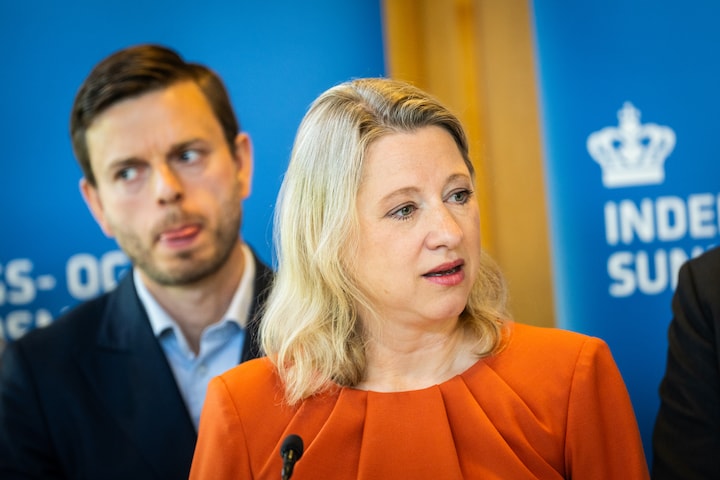New study to examine adoptions, but David is 'very disappointed'
The government, the Socialist Party and the Conservatives have agreed to conduct a historical survey of adoptions to Denmark from 70 countries in the period 1964-2016.
But this outcome is unsatisfactory, according to both experts and two adoptees who DR has spoken to.
- I am very disappointed, says David Kildendal Nielsen, who was adopted from India.
- The government, the Socialist Party and the Conservatives are presenting it as a great deal that is good for the adoptees, but it is a descriptive historical review, and we have had five of them that had no consequences.
David Kildendal Nielsen, who is adopted himself, is not satisfied with the agreement that has been reached:
Afspil video
24 sekunder
He is supported by Caroline Adolphsen, who is a professor of welfare law at Aarhus University and has followed the case.
- In any case, it is not a study that will give us answers to the things that I and the adoptive families want.
- Because it is an investigation that looks historically at what has happened. In other words, a statement of what has happened, but without dealing with the legal issues.
They would have liked the investigation to also have placed legal responsibility.
- Could Denmark have done something differently? Are there any Danish authorities or individuals who can be held accountable?, says the professor.
Three points in the agreement
DKK 22.8 million has been allocated to conduct an impartial study of adoption mediation to Denmark from all partner countries in the period 1964-2016.
The agreement allocates 15 million kroner from 2026 to 2029 for an offer for internationally adopted people. Here they can receive free and impartial legal advice about their adoption case.
The agreement also establishes a working group that must present its proposal for what the future adoption system in Denmark could look like by the summer of 2026. After that, a political position must be taken on the working group's proposal.
Source: Ministry of Social Affairs and Housing and Ritzau
There is no doubt that the donor countries have made mistakes, says Caroline Adolphsen. But according to her, something could also have been different on the Danish side.
- So it's really, really a shame that we don't get to deal with that part, says the professor.
In addition, she also points out that the investigation only extends to 2016, and there will be children who have been adopted to Denmark from 2016 onwards whose cases are not investigated.
22.8 million kroner has been allocated to carry out the impartial historical investigation.
Part of the money was already earmarked back in the fall of 2023, but it has been a lengthy process to agree on the framework for the study of the adoption area.
Minister: Very difficult to place specific responsibility
Several times, a united opposition has demanded that the investigation should not only be a historical discovery, but should also be able to place legal responsibility.
But now it has changed to the great annoyance of David Kilendahl Nielsen.
- Although we stood here two months ago and there was a majority outside the government for a legal investigation, that majority is unfortunately no longer present, he says.
Minister of Social Affairs and Housing Sophie Hæstorp Andersen (S), who has refused to investigate legal responsibility, explains that in 2025 it is too difficult to go back and assign responsibility.
She tells DR that there is no doubt that "there are adoptees who have a strong suspicion that their adoption has been tainted by, for example, identity swapping".
- The government really wants to help the adoptees by providing them with legal advice, and we also want to learn more about the past so that they have something to stand on in relation to what it was like.
- But when it comes to ultimately assigning responsibility, it is really difficult to stand in 2025 and go back to another country's rules from 50 years ago and assign specific responsibility.
It is difficult to gain legal certainty that responsibility is placed in the right place, she believes.

Minister of Social Affairs and Housing Sophie Hæstorp Andersen (S) refuses to use the investigation to legally hold anyone specifically responsible. (Photo: © Emil Nicolai Helms, Ritzau Scanpix)
What use is all this knowledge and history writing if there are no consequences?
- I think it's important to understand that there are several people who have uncovered different cases, but that's not the same as saying that all adoptions back in time have been wrong.
But for those where it does, why shouldn't it have consequences?
- For those who have experienced it, it is now possible to have their case reviewed. We now even provide legal advice to help you do so, and some have already filed cases in court.
- We would of course like to support people in getting clarification if they believe that something specifically illegal has happened - it is just important to say that this is not the same as saying that all adoptions to Denmark have been illegal or wrong.
Crisis in the adoption field in Denmark
The adoption field in Denmark has been hit by one crisis after another.
Back in the fall of 2023, the Danish Social Appeals Board became aware of information indicating that Danish International Adoptions' (DIA) collaboration with the South African organization Impilo was not in accordance with Danish regulations.
At the beginning of 2024, DIA closed, following accusations of circumventing Danish and international rules for adoption, and since then it has not been possible to sign up for the waiting list to adopt from abroad.